Touro College School of Health Sciences Occupational Therapy Program Holds First-Ever Gala
Alumni and Faculty Celebrate School and Profession
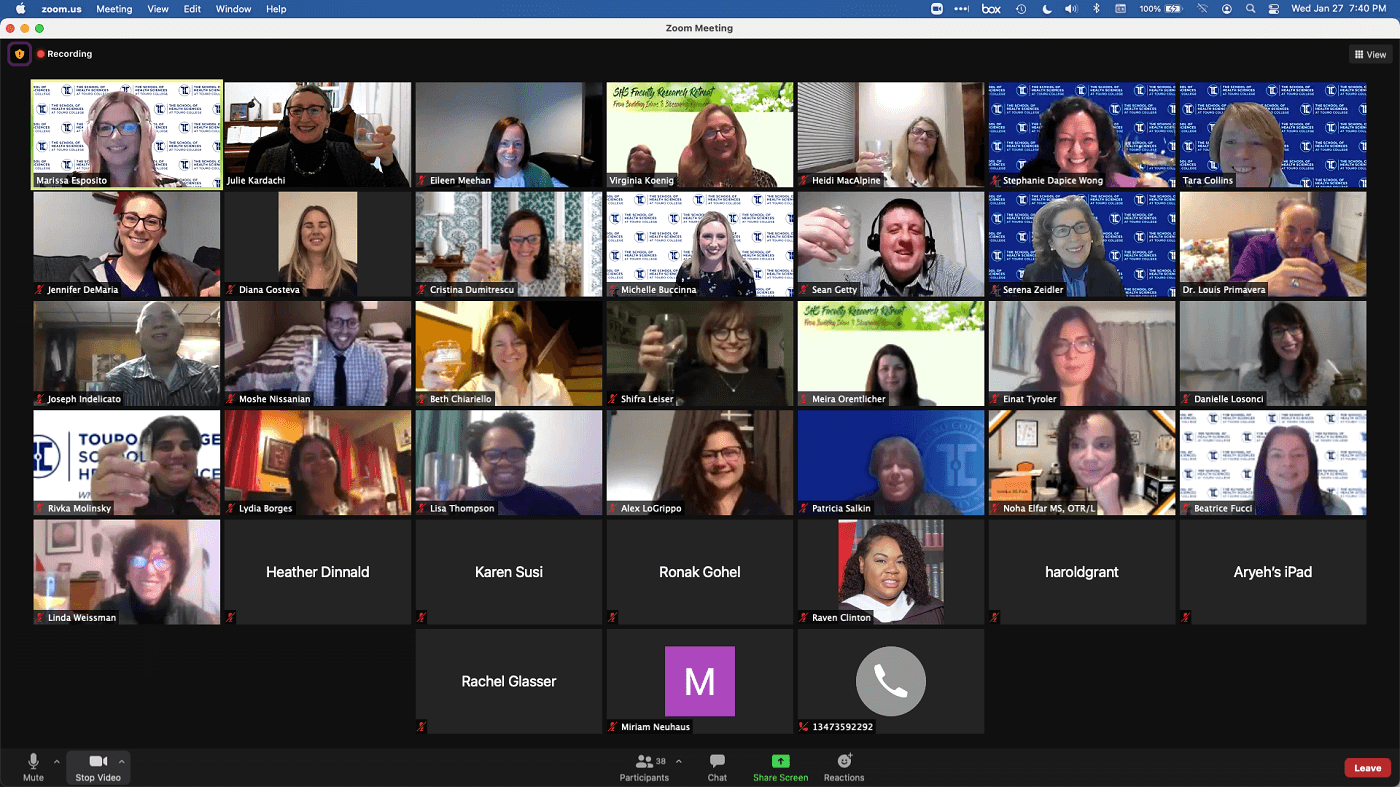
Touro College School of Health Sciences (SHS) Occupational Therapy (OT) Program held its first-ever alumni gala on January 27.
Due to the coronavirus, the gathering was held virtually, but the honorees and attendees were still able to meet and reminisce with friends and faculty members in breakout Zoom rooms during the program. The event honored several faculty, alumni, and clinical partners and celebrated the impact SHS’s occupational therapy program has had over the last thirty years. The gala was accompanied by an auction with proceeds going to support SHS OT clinical programs.
This year’s award recipients were:
- Community Partner: St. Charles Hospital
- Vera Jean Clark Brown Service Award: Dr. Virginia Koenig
- Distinguished Leadership Award: Dr. Tara Collins
- Occupational Therapy Clinician Award: Dr. Heidi MacAlpine & Moshe Nissanian
- Occupational Therapy Alumni Award: Sean Getty, Anna Astrova & Diana Gosteva
Vera Jean Clark Brown Service Award
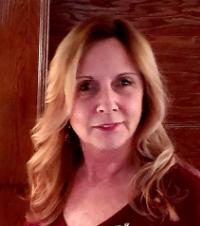 Virginia Koenig, OTD, OTR/L
Virginia Koenig, OTD, OTR/L
Virginia Koenig, OTD, OTR/L, incorporates the values of social justice in her work as an occupational therapist.
“The occupational therapy program and the Touro community evolve as society changes,” explained Dr. Koenig, an assistant professor and fieldwork coordinator in the SHS OT program. She noted the disproportionate effects of the pandemic on low-income Americans and the Black Lives Matter movement. “OT has a role here: we call it occupational justice—making sure everyone has the ability to lead a fulfilling life regardless of their income.”
Since Dr. Koenig joined Touro in 2013, students in the OT program have been able to choose from a wide range of traditional and non-traditional areas for their fieldwork. In addition to the schools and hospitals where typical fieldwork takes place, OT students from SHS have worked with the Head Start program, in a women’s homeless shelter, and in a local juvenile detention center. Under her leadership, OT students have also visited rural Kentucky to work in the Eula Hall Health Clinic and Shelby Valley Medical Clinic.
“We’re going beyond the traditional and even the fairly non-traditional roles that OT has had,” stated Dr. Koenig. “We go into the community and provide services in emerging practice settings. This is the way our profession is developing, and we have responded to that. Instead of staying stagnant, we are branching out.”
Dr. Koenig is especially proud of the work OT students have done in the Nassau County Juvenile Detention Center and the differences they have made in the lives of the inmates.
“We work on skills like building independence, job acquisition, and anger management,” she explained. “We also focus on educational skills so if these individuals return to schools they’ll have a better chance of success. Community rehabilitation has shown to be one of the best ways to reduce recidivism.”
Dr. Koenig’s most recent work focused on increasing health literacy and teaching Touro students to recognize health illiteracy. She received a Touro College Dean’s Research grant for her health literacy program and the program has since been incorporated into SHS-Bayshore’s OT curriculum. Her work combatting health illiteracy was recognized by the US Department of Health and Human Services. Dr. Koenig believes that eradicating health illiteracy is part of the overarching mission of the occupational therapy profession.
“Health illiteracy is a silent epidemic,” she reflected. “Our mission as occupational therapists is to help our clients recognize their abilities, despite any roadblocks or challenges they face. We want to help them recognize their value and participate in what’s important to them across their lifespan—from birth to death.”
Distinguished Leadership Award
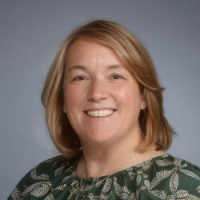 Tara Collins, DHS, OTR/L
Tara Collins, DHS, OTR/L
In her role as senior academic fieldwork coordinator, Tara Collins, DHS, OTR/L, believes in expanding the possibilities of occupational therapy. “I like bringing occupational therapy into non-traditional sites where the discipline hasn’t been used in the past, like in a Head Start program, or a community mental health initiative, or an assisted living facility,” explained Dr. Collins, the recipient of The School of Health Sciences Occupational Therapy Distinguished Leadership Award.
This stems from her belief about the field itself. “It’s hard to have an operational definition of occupational therapy since it’s dependent on the setting and the goal,” said Dr. Collins. “We look at the whole person and understand what is important to them: is it getting up and getting dressed and regaining functions in their hands so they can get back to woodworking? Is it dealing with mental health issues so they can go to work every day? In every area of occupational therapy practice, you might be working towards a different goal.”
Dr. Collins joined Touro in 2007. In her fieldwork role, she locates and sets up students for their required fieldwork placement, taking scope of both the student and the placement site. “I look at the site: does it provide good mentorship for the students?” Dr. Collins explained. “I look at the student and ask: Is this site a good fit? A great site can’t be a match for every type of student. Who is the supervisor? Will the supervisor be a good fit? Some sites are meant for certain types of students. Our goal is to match students in the best way to build on their skills.”
This has been especially challenging during the pandemic where many fieldwork sites have been shut down. Dr. Collins was instrumental in organizing a wide-ranging virtual fieldwork placement program where students have created caregiver support groups at the Alzheimer’s Research Center; created social groups for seniors in an assisted living facility; and developed skills-based Zoom sessions for disabled children. “I didn’t want our students to postpone their graduation,” said Dr. Collins. “Now more than ever, we need qualified OT practitioners.”
In addition, this year Dr. Collins took on the role of community engagement coordinator where she works to develop relationships with alumni and the larger community.
Occupational Therapy Clinician Award
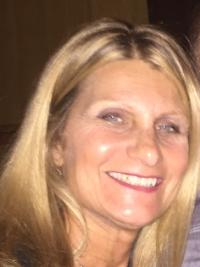 Heidi MacAlpine OTD, M.Ed., OTR/L
Heidi MacAlpine OTD, M.Ed., OTR/L
Heidi MacAlpine OTD, M.Ed., OTR/L, has been an occupational therapy practitioner for 30 years and joined Touro as a mental health and pediatric fieldwork educator in 2015. In addition to her occupational therapy credentials, Dr. MacAlpine is a certified yoga instructor and maintains her own practice, Well Alignment.
Through her work, Dr. MacAlpine believes in bringing the profession more in touch with its roots in the mental health world. “I believe there’s been a paradigm shift in the nature of our field to focus on the whole person,” stated Dr. MacAlpine. This effort, she maintains, is more important than ever as the pandemic has gradually affected all parts of patients’ lives.
With many fieldwork placements unavailable due to the pandemic, Dr. MacAlpine streamlined and created new fieldwork opportunities for students in the OT program. Through hard work, dedication and professional collaboration, Dr. MacAlpine, Dr. Collins, and Dr. Koenig were able to put together a curriculum for both the Bayshore and NYC occupational therapy students on Program Development and community-practice that connected the learned information into practice. These virtual fieldwork placements included running fall prevention webinars for seniors in Shelter Island, social skill groups for children with disabilities, and exploring the possibilities of occupational therapy telehealth sessions.
Dr. MacAlpine also works to extend the profile of the profession itself, working with various community organizations in offering her services as an occupational therapist. She maintains a podcast with the New York State Occupational Therapist Association and recently launched a weekly radio program, "Meeting Your Needs.”
Both through her work with her own patients and her activities on behalf of the profession, Dr. MacAlpine has been a role model for many SHS OT practitioners.
“We’re researchers constantly searching for filling the gaps within the community,” said Dr. MacAlpine. “I want to expand how my students think about the profession outside of the box. Look for a need and know how occupational therapy’s knowledge-base can provide services.”
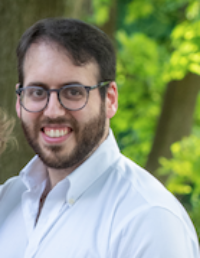 Moshe Nissanian, OT
Moshe Nissanian, OT
Moshe Nissanian, OT, is a graduate of Touro's Lander College for Men and an alumnus of the School of Health Sciences Occupational Therapy program. Since graduating from the OT program in 2014, Nissanian has specialized as a pediatric occupational therapist and practiced in a variety of settings including public schools, charter schools, sensory gyms, and in homecare. He is currently employed by the New York City Department of Education and works with diverse populations that include children with autism spectrum disorder, cerebral palsy, developmental delays and delays in visual perception and executive functioning skills.
During the pandemic, Nissanian was recruited by faculty members in the occupational therapy program to launch an innovative fieldwork experience that functioned as part of the college’s preexisting Employee Health and Wellness Program. (Touro’s Employee Health and Wellness Program was developed by SHS OT’s Dr. Julie Kardachi.) Nissanian led a team of students focused on building resilience in the children of Touro faculty members during the pandemic.
Together with fellow honoree Dr. MacAlpine, Nissanian and his team took the first steps in launching the program. “Initially, we focused on doing research on the mental health effects of prolonged quarantine and how similar situations can impact the occupations of children,” said Nissanian. “We developed a needs assessment and surveys to reach our potential participants.”
Some of the programs the fieldwork group considered was ergonomic modifications, social skill packets, and positive coping methods. “We’ve established a need for the program and we plan to take it further,” said Nissanian. Nissanian hopes that even when the pandemic ends, the tools that the group developed can be used in other situations.
Occupational Therapy Alumni Awards
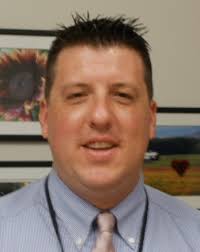 Sean Getty, Class of 2005
Sean Getty, Class of 2005
Sean Getty, OTD, MS, OTR/L, of Oakdale, NY, discovered his future career after a brief job stint as a hydrogeologist. “I realized I wanted a job that was helping people and allowed me to be creative,” Dr. Getty explained. “Once I found out about becoming an occupational therapist it just fit.”
Dr. Getty was a member of Touro College School of Health Sciences Occupational Therapy Program-Bayshore’s first classes and graduated in 2004. (He was a member of a six-person cohort.)
Initially, he planned on working in the assisted technology field, but his psycho-social professor, the late Dr. Lana Goodman, encouraged him to try out working in the mental health field.
“She was a significant influence on me,” recalled Dr. Getty. “She had so much confidence in me. I also had a great fieldwork placement that led me down this path.”
Shortly after his graduation, Dr. Getty began working as an OT for Central Nassau Guidance and Counseling Services. The organization quickly expanded, and Dr. Getty found himself filling various supervisory roles, including overseeing a drop-in program and managing a coffee house run by clients of the program. Patients in his care suffered from serious mental illnesses including psychosis, schizophrenia, major depression, and body dysmorphia.
“If you look at all the disciplines that work with these populations, like social work or speech therapy—they’re mainly verbal or social,” said Dr. Getty. “But if you’re an occupational therapist you’re hands-on with this population. You are teaching them to gain or regain the skills they need to recover so they can live to their full potential. Our clients need to be able to do things like get a job and pay their bills and do their laundry. All these things we take for granted, this population never learned because of their mental illnesses.”
One quality for success as an OT in the mental health field, Dr. Getty stressed, is patience.
“When you look at occupational therapy practitioners who work in other disciplines, change happens relatively quickly,” Dr. Getty explained. “In mental health settings, it typically takes much longer to change.”
In 2012, he became a clinical assistant professor at Stony Brook. In 2015, he became the head coordinator for the South Hampton campus program. Dr. Getty completed his post-doctorate at the University of St. Augustine for Health Sciences; he was promoted to clinical associate professor as well as interim chair of the entire Stony Brook OT program in 2020.
As interim chair, Dr. Getty oversees Stony Brook’s two occupational therapy programs in the Stony Brook and Southampton campuses. His responsibilities run the gamut from admissions to course schedules and teaching four courses.
Though he no longer practices full-time as a clinician, Dr. Getty said that he brings the principles of occupational therapy to his volunteer work in his community. He serves as board president of Connetquot Foundation for the Advancement of Children, a non-profit dedicated to promoting educational opportunities and mental health awareness in the Connetquot school district. He is also board secretary for Connetquot Cares Community Coalition, a non-profit focused on promoting mental health initiatives and substance abuse treatment in the district.
“A good OT Is always looking to help and is always asking: How can I make an impact?” Dr. Getty concluded. “Occupational therapists are always looking to fill the cracks and put their services to use and make a difference.”
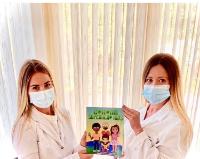 Anna Astrova, Class of 2012, and Diana Gosteva, Class of 2014
Anna Astrova, Class of 2012, and Diana Gosteva, Class of 2014
At the height of the pandemic, occupational therapist Anna Astrova, OTR/L, and occupational therapy assistant Diana Gosteva, COTA/L, were besieged by calls from parents desperate for advice about teaching their kids about Covid-19. The two Touro College School of Health Sciences Occupational Therapy Assistant Program alumni decided to do something about it. In September, they published Corona Superhero Kids, a story of a young child learning about Covid-19 safety precautions. The book has sold briskly on Amazon and earned accolades from teachers, parents, and healthcare practitioners.
“We wanted to take something so negative and scary and unknown and put a positive twist on it,” explained Gosteva, who graduated from the SHS OT Assistant Program in 2014. “A lot of parents were asking: ‘How do I get my son to wash his hands?’ and ‘How do I get my daughter to stop putting her fingers in her mouth?’ We realized that writing a children’s book was the easiest and fastest way to put out the information for everyone.”
“A lot of parents were reaching out to us since they hadn’t been getting services,” added Astrova, a 2012 graduate of the SHS OT Assistant Program. “We were on the phone constantly and a book was the perfect way to get our message across.”
The illustrated book, told in rhymes, tells the story of a young boy who can’t play with his friends because of Covid-19. Instead, he stays inside and meets Coronvirus superheroes, heroes patterned after basic safety precautions like keeping a mask on and staying six feet away. The book’s success has been especially meaningful for Astrova who dedicated the book to her grandfather Semen Kulik who died from coronavirus last year.
Astrova and Gosteva work together in a large rehabilitation center in Brooklyn. They described their time in Touro as formative.
“Touro gave me a wonderful fieldwork affiliation and I was immediately hired by them after I graduated,” said Astrova who has since risen to supervisor. “Touro taught us what it’s like to work in the real world.”
Gosteva said that SHS professor Julie Kardachi, OTD, OTR/L, CLA, had a profound effect on her own career choice.
“Dr. Kardachi was one of my biggest mentors and I always looked up to her,” recalled Gosteva. “She showed us her resume and it was full of different positions and I really wanted a resume like that. The more places you practice OT the more you learn about yourself and what you are capable of.”
Astrova and Gosteva began working together last year and started writing the book in April. The two found an illustrator in current Touro College student Tehilla Mammon. They said the writing came naturally to them.
“As an OT, creativity is in our toolbox,” said Astrova. “It’s just about seeing different possibilities of what you can do. The creativity never ends.”

